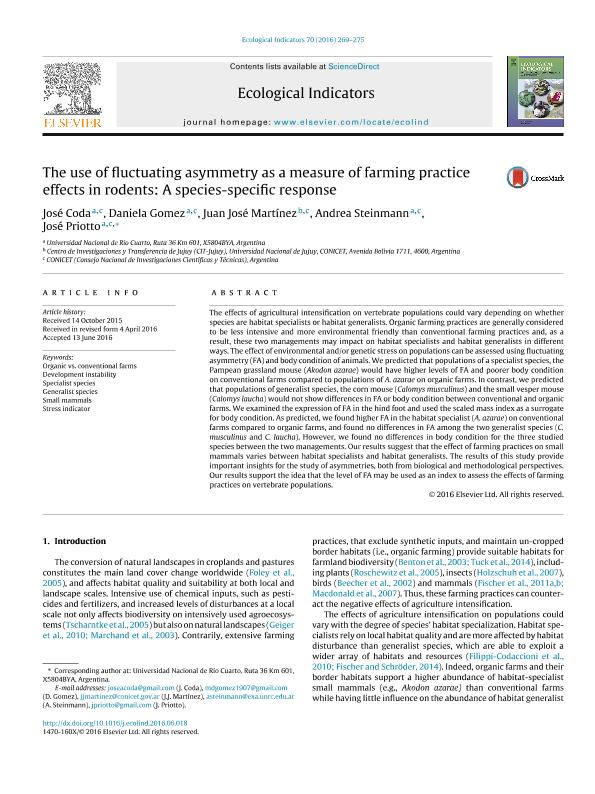Artículo
The use of fluctuating asymmetry as a measure of farming practice effects in rodents: A species-specific response
Coda, José Antonio ; Gomez, Maria Daniela
; Gomez, Maria Daniela ; Martínez, Juan José
; Martínez, Juan José ; Steinmann, Andrea Rosa
; Steinmann, Andrea Rosa ; Priotto, Jose Waldemar
; Priotto, Jose Waldemar
 ; Gomez, Maria Daniela
; Gomez, Maria Daniela ; Martínez, Juan José
; Martínez, Juan José ; Steinmann, Andrea Rosa
; Steinmann, Andrea Rosa ; Priotto, Jose Waldemar
; Priotto, Jose Waldemar
Fecha de publicación:
11/2016
Editorial:
Elsevier Science
Revista:
Ecological Indicators
ISSN:
1470-160X
Idioma:
Inglés
Tipo de recurso:
Artículo publicado
Clasificación temática:
Resumen
The effects of agricultural intensification on vertebrate populations could vary depending on whether species are habitat specialists or habitat generalists. Organic farming practices are generally considered to be less intensive and more environmental friendly than conventional farming practices and, as a result, these two managements may impact on habitat specialists and habitat generalists in different ways. The effect of environmental and/or genetic stress on populations can be assessed using fluctuating asymmetry (FA) and body condition of animals. We predicted that populations of a specialist species, the Pampean grassland mouse (Akodon azarae) would have higher levels of FA and poorer body condition on conventional farms compared to populations of A. azarae on organic farms. In contrast, we predicted that populations of generalist species, the corn mouse (Calomys musculinus) and the small vesper mouse (Calomys laucha) would not show differences in FA or body condition between conventional and organic farms. We examined the expression of FA in the hind foot and used the scaled mass index as a surrogate for body condition. As predicted, we found higher FA in the habitat specialist (A. azarae) on conventional farms compared to organic farms, and found no differences in FA among the two generalist species (C. musculinus and C. laucha). However, we found no differences in body condition for the three studied species between the two managements. Our results suggest that the effect of farming practices on small mammals varies between habitat specialists and habitat generalists. The results of this study provide important insights for the study of asymmetries, both from biological and methodological perspectives. Our results support the idea that the level of FA may be used as an index to assess the effects of farming practices on vertebrate populations.
Archivos asociados
Licencia
Identificadores
Colecciones
Articulos(CCT - CORDOBA)
Articulos de CTRO.CIENTIFICO TECNOL.CONICET - CORDOBA
Articulos de CTRO.CIENTIFICO TECNOL.CONICET - CORDOBA
Articulos(INECOA)
Articulos de INSTITUTO DE ECORREGIONES ANDINAS
Articulos de INSTITUTO DE ECORREGIONES ANDINAS
Citación
Coda, José Antonio; Gomez, Maria Daniela; Martínez, Juan José; Steinmann, Andrea Rosa; Priotto, Jose Waldemar; The use of fluctuating asymmetry as a measure of farming practice effects in rodents: A species-specific response; Elsevier Science; Ecological Indicators; 70; 11-2016; 269-275
Compartir
Altmétricas



